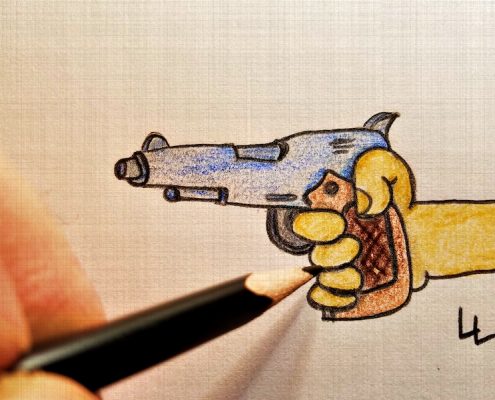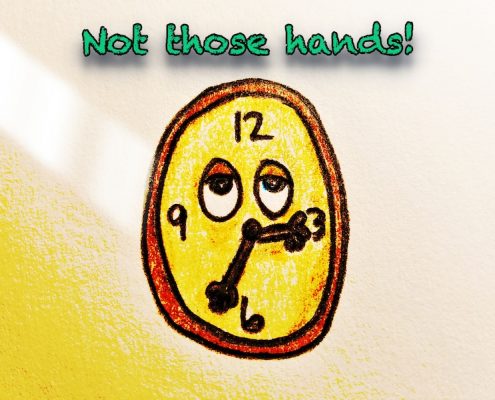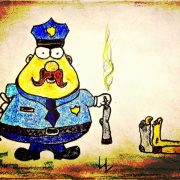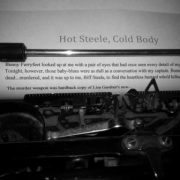5 Ways Officers Can Avoid the Dreaded Pucker Factor
Pucker Factor. Two simple words that, when spoken separately, have truly harmless meanings.
1. Pucker: a rounded shape by folding or wrinkling, such as puckering your lips.
2. Factor: an element contributing to a result.
However, when those two words are combined into a single phrase they take on a whole new meaning, a meaning that refers to the instant tightening of a particular southerly body part.
It’s odd, but when you consider the usual function of that persnickety body part, things like “early warning system,” “saving lives,” and “draw your weapon,” don’t normally come to mind. Actually, even in a puckered state one wouldn’t normally associate those things with that tiny muscle. Nope, not at all.

“Drawing” a service weapon
However, ask cops about their first reaction to the instant puckering of the factor muscle and they’ll probably mention drawing their service weapon, preparing to fight, or do whatever it took at that moment to stay alive, because danger was imminent.
Yes, the Pucker Factor is indeed a cop’s early warning system. It causes rapid heart rate, sweating and, hopefully, an immediate reflex action that causes the officer to revert to his/her training, because reasoning skills are greatly diminished during a Pucker Factor incident.

The “pucker factor” sometimes causes strange reactions.
For police officers, the Pucker Factor can be triggered by a number of events, usually all related to threats and a crisis at hand. For example, a traffic stop at night where the suspect reaches for a firearm in the glove compartment, or while searching a vacant building for a wanted person the crazed suspect pops out of a closet and charges the officer with knife in hand. Even a radio call directing an officer to the scene of a shots-fired call can bring on an onset of PF.
So what can an officer do to reduce the possibility of encountering PF-inducing situations? Here are 5 ways to decrease the dreaded PF’s.
1. Wear your seat belts, and SLOW DOWN! Losing control of a patrol car while responding to an in-progress call is one of the top causes of PF. Officers, remember the first time you “fishtailed” at 85mph? How about rounding a curve at 90 during a pursuit and meeting a car driving on the wrong side of the road?
Both 10’s on the PF 1-10 scale.
2. Never assume that people see your blue lights and heard the siren. This happens all the time—while running lights and siren to answer an emergency call, officers change lanes to pass a car and suddenly the vehicle in front drifts over into the passing lane to make a left turn. They didn’t have a clue the police car was there because the driver was (a) talking on a cell phone, (b) drunk, (c) daydreaming, (d) were playing their radio at peak volume and never looked in the rear-view mirror, etc. And, let’s not forget the person who slams on brakes when they realize a police car is behind them. PF score of 7.
3. Patience. Take the time to assess the possibilities that could occur during a traffic stop or while answering a call. Is the suspect wanted? Did you run the plates through to see if the car was stolen? Is the guy sitting on the couch agitated? On drugs? Why is he sweating profusely? Where are his hands? Run all the checks before diving into any situation!
You’re in a hurry because your shift ends in fifteen minutes, so you skip running the subject’s name through the system. Result? He’s wanted for armed robbery and decides killing you is better than going to prison. He pulls a gun from his waistband. PF score of 10.
4. Never operate on the assumption that each person encountered will do the right thing or obey your commands. Not everyone respects the badge and your authority. So keep your guard up and be prepared to use force every single time you respond to a call. That young woman in the mini-skirt, or the handsome man in the business suit? They can fight, shoot, stab, and cut as well as anyone.
The woman who catches you by surprise by pulling a gun from her purse while your firearm is still holstered … PF score 8. Stupid score = 10.
5. No ambush. No ambush. No ambush! Always plan an escape route!
You get a call at 3 am. It’s a “female needs assistance” call. She’s in an alley that has only one way in. You wave off backup and head in thinking it’s “only a girl.” Suddenly, a car pulls in behind you and shots are fired. The driver of the car that blocked you in the alley, the person who’s sending a barrage of 9mm rounds in your direction, is the young woman’s boyfriend, the cop-hater you arrested a year ago. He served nine months in the county jail and spent 8 of those months planning his revenge.
PF score 10.
Police officers are human and they, like most people, want to see the good in others. Unfortunately, that “good” is becoming more and more scarce with each passing day, while PF instances are constantly on the rise.
I guess the real trick to reducing pucker factor instances is using commonsense, not taking chances, reminding constantly aware of your surroundings, and attending regular training.
Remember officers (both real and fictional) – Always watch the hands!














I always learn something, or relearn something, reading your posts.
Good information presented with humor. A great way to start the day.